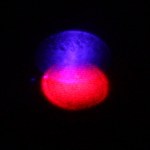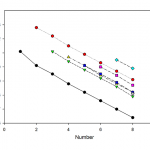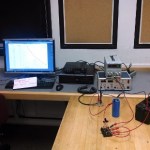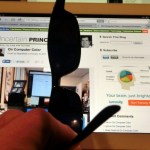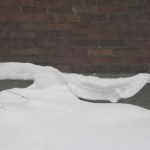Science
Sometimes those are good descriptors. I read a happy story for a change this morning: it's about Arunachalam Muruganantham, an Indian man who embarked on a long crusade to make…sanitary napkins. Perhaps you laugh. Perhaps you get a little cranky at a guy who rushes in to meddle in women's concerns. And there's some good reason to feel that way: he starts out with embarrassing levels of ignorance.
He fashioned a sanitary pad out of cotton and gave it to Shanthi [his wife], demanding immediate feedback. She said he'd have to wait for some time - only then did he realise that periods were…
In which we move out of the original trilogy, and into J.J. Abrams territory. Cue the lens flare!
This week's random assortment of topics includes travel, airports, physics models of loading and unloading planes, uses and abuses of curve fitting, odd stuff we get sent to review, and high-speed video cameras.
Miscellaneous links:
-- Rhett's Atlanta airport post.
-- The airplane loading study I was thinking of is Optimal boarding method for airline passengers, by Jason Steffen, from 2008.
--The Slo Mo Guys, Smarter Every Day, Veritasium.
--Trespassing on Einstein's Lawn by Amanda Gefter.
That'…
In October 1988, I trashed my parents' basement in order to get into college.
OK, the causal connection is a little indirect, but it's there. I was applying to college that fall, and needed to write an essay to go with my application. I've always been able to write stuff with very little effort, so I banged out something that I thought was adequate, and showed it to my guidance counselor, who said "No way." My parents backed her up on this, and I had to go write another one.
The problem was that while what I had written was reasonably polished, it was also glib and superficial-- because I'm…
STEMconnector®, "the one-stop shop for who's doing what in science, technology, engineering and math", has joined the Festival's growing cadre of Sponsors, bringing to the event a proven ability to keep professionals, students and the public abreast of STEM news and updates across a broad spectrum.
"STEMconnector® is proud to be a partner for the USA Science Festival as we support and endorse the largest gathering in the world celebrating science and engineering," says Edie Fraser, CEO of STEMconnector. "We couldn't be happier than to see young people interested in STEM and believe in the…
This year's "Flame Challenge" asks scientists to explain color in terms an 11-year-old can understand. The rules limit answers to either 300 words of text or a 6-minute video. 300 words is ridiculously short, so video is clearly the way to go. Of course, I'm not much of a video expert, but then, one of the finalists last year (when the question was "What Is Time?") was just a guy talking into a webcam, and hell, I can do better than that. So I did this:
(This is, obviously, why I was fooling around with looking at the spectrum of light from my laptop a little while back...)
The approximate…
I got book edits this week, gave an exam on Thursday, and pre-registration for our spring term classes is just beginning, so I have a parade of students begging to get into this course or that one to deal with. So I have no more time for detailed blogging, but will do a bit of tab-clearing to end the week.
This piece about bimodal exams resonated well with my experiences in intro classes. I see a lot of the same thing, though with less statistical power, given that our maximum class size is 18. But in general, the "well-prepared students are bored, poorly-prepared students hopelessly lost"…
I've written about conflicts of interest (COIs) a lot over the years. COIs are important in medicine and science because, as much as physicians and scientists like to think that they are immune to such things, we are as human as anyone else. We are just as prone to unconsciously (or consciously) being influenced by self-interest related to our COIs. Most of the time, for purposes of science, COIs are considered to be mostly financial in nature: employment or payments from a drug company, a financial interest in a treatment being studied, and the like. Andrew Wakefield is a classic example in…
Last week, we looked at the resistance of a voltage sensor by using the discharge of a capacitor, getting a value that was a bit high, but not wildly out of line with the specs. This time out, we're going to look at the resistance of a current meter, because some students asked about it during Wednesday's exam review session.
The question came up because one of the things I have on the standards for the circuit portion of the class is knowing how to hook up a current meter and a voltage meter in the appropriate ways. This is strangely confusing for a lot of students, which gets annoying, as…
Rare is the occasion when I disagree significantly with my collaborator Steve Novella, but this is one of those times. It's a measure of how much we agree on most things that, even in this case, I don't completely disagree with him. But, hey, it happens. I'm referring to Steve's post yesterday in which he gushed over the new policy at PLoS (Public Library of Science) regarding articles published in their journals. (Steve rarely gushes.) Here's the policy:
In an effort to increase access to this data, we are now revising our data-sharing policy for all PLOS journals: authors must make all…
New Scientist, the world's most-read science and technology weekly, returns to the Festival as a key Media Partner, once again greatly enhancing our ability to reach out globally to the growing number of ultra-inquisitive Festival fans who just can't get enough insight into science's new and emerging frontiers!
Known as the magazine for "people who ask why", New Scientist, with its solid team of writers and experts, brings a comprehensive and inquisitive approach to reporting on a wide array fast-developing and futuristic developments in science and technology --from space,…
Matt Reed, who will forever be "Dean Dad" to me, has a post on "new" topics that might be considered for "gen ed" requirements, that is, the core courses that all students are required to take. This spins off a question Rebecca Townsend asked (no link in original), "Should public speaking be a general education requirement?" the idea being that public speaking is such an essential skill that everyone ought to learn it at some point. Reed adds "entrepreneurship," "[computer] coding" and "personal finance" as other things that might fall into the same essential category.
Now, it's important to…
This week's episode of Uncertain Dots is, if anything, even more free-form than previous weeks, including a brief cameo from one of Rhett's kids:
Topic covered include the arrangement of faculty offices, the relative lack of demos for E&M (compared to mechanics, where there are endless videos to analyze, etc.) a little bit about science journalism and sports journalism, how we deal with (or don't) the problem of including background information in our blogs, the need to sometimes bring your kids to campus or cancel classes, teaching while sick, tracking the flu, precision measurement and…
I'm running errands today, so here's a quick post picking up a question from last week's Olympic physics hangout: What sport involves the least physics?
One of the kids in the classes we were video chatting with asked that, and I really like the question, though it was a struggle to answer. It's one of those questions that will ultimately be like an excessively-zoomed-in data graph-- whatever the answer, everything starts with a pretty high baseline of physics content, just because there's physics in everything.
For the Winter Olympics, my original suggestion was ski jumping, thinking it was…
Grant deadlines strike again, and there's no new Insolence for you to peruse today. (The problem with doing real science, as opposed to blogging, is that you actually have to apply endlessly for grant money, and, believe it or not, that comes first, before even Insolence.) Fortunately, I've been made aware of an endless source of entertainment for you, my readers. I've explained before from where I chose the pseudonym "Orac." It was from what was at the time a popular British science fiction series that ran for four years back in the late 1970s and early 1980s. Unfortunately, the passage of…
Over at Backreaction, Bee takes up the eternal question of scientists vs. journalists in exactly the manner you would expect from a physicist: she makes a graph. Several of them, in fact.
It's generally a good analysis of the situation, namely that scientists and journalists disagree about how to maximize information transfer within the constraints of readership. That's a very real problem, and one I struggle with in writing the blog and books, as well. Lots of people will read content-free piffle, but if the goal is to convey good, solid science to as many people as possible, well, that's a…
I spent a while on Friday morning talking about the physics of the Olympics with a couple of science classes in Tennessee and Lawrence Norris from the National Society of Black Physicists, organized by Adam "@2footgiraffe" Taylor. This was done via a Google hangout, so the video is recorded on YouTube:
The recording seems to have mostly remained on my video feed, which is a little unfortunate. Lawrence didn't have a camera, though, so he's a disembodied voice. I liked the first question-- "What Olympic event involves the least physics?"-- though it's a tricky one to answer.
Anyway, it was a…
For the latest in our ongoing series of post where I overthink simple questions, I'd like to present the longest single continuous experiment in Uncertain Principles history, which took six and a half hours yesterday. All to answer the question in the post title.
This may seem like a waste, given that I could download a spec sheet, but it was a simple extension of yesterday's lab. I'm teaching E&M this term, and we're wrapping up the circuits portion of the class. Yesterday's lab was about the discharging of capacitors.
This is one of those concepts that sneaks in largely as a way to…
In comments to the post on computer display colors, Will Slaton notes that Mac displays emit polarized light. And, indeed, this is an inherent part of the backlit LCD technology-- the individual pixels are bits of liquid crystal between two polarizers, and an applied voltage causes the liquid crystal molecules to flip between a state where they rotate the polarization of light, and a state where they don't. In one of those configurations, the polarizers block the light, and in the other, they let it pass. By rapidly varying the voltages, you can make the pixels flash on and off in the right…
Ages and ages ago, I posted the picture that's the "featured image" above, and asked people to submit physics comments about it. Then I got distracted by a series of shiny things, and never did anything with the handful of responses I got. Because I'm a Terrible Person.
Anyway, it's long overdue, but here are the responses, with some comments from me. The first to send me something was Keith Hester, who emailed:
I find quite intriguing the lengthy unbroken --- and seemingly unsupported --- extension of snow that has slid over the left edge of the roof. The coefficient of friction between…
In which Rhett and I talk about color vision, undergraduate research projects, blog networks, outreach activities, and how thermodynamics is a lie.
Things mentioned in the discussion:
The Flame Challenge
My post about looking at computer monitors with a spectrometer
Physics Quest
I'm inadvertently doing a bit of product placement here-- the T-shirt I'm wearing is from Surviving the World, and the water bottle I'm drinking from is from the Institute for Quantum Computing in Waterloo. I expected it to be colder in my office on campus, but it was actually pretty warm, so I took off the other…
